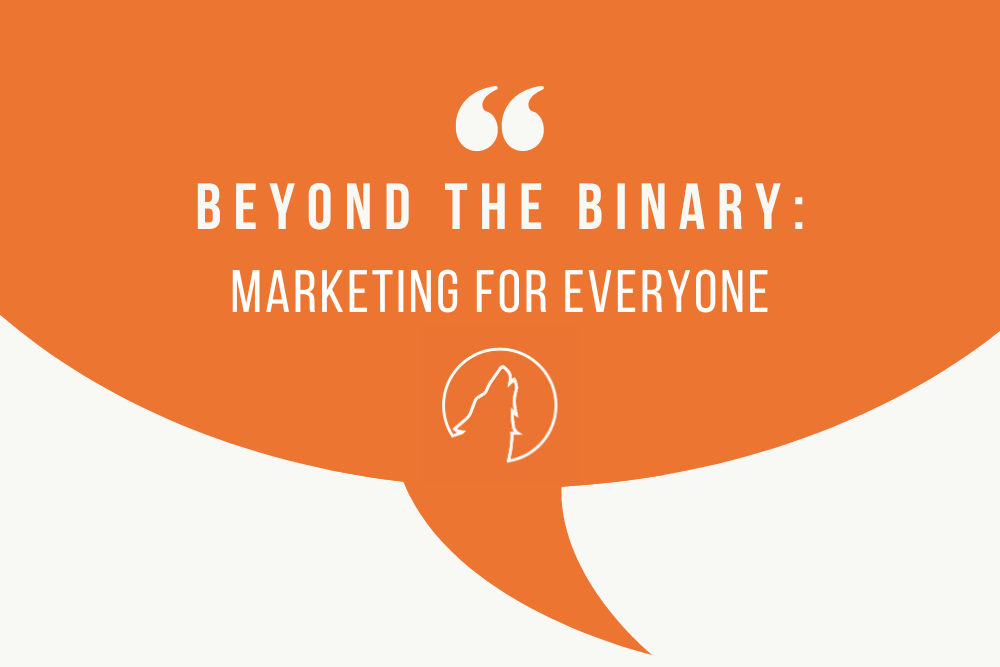Non-binary marketing is the future, and it’s not going away anytime soon. This makes some uncomfortable, and I get it–opening yourself up to new ideas that never pervaded your world can be unsettling. But this isn’t like Santa Claus. Just because you don’t see it doesn’t mean it isn’t there, existing with or without your knowledge or permission. And ignoring it won’t make it go away either… but it may make your business disappear.
And despite the rise in representation and seemingly the number of people speaking up and embracing their non-binary genders in recent years, this is not some new idea or passing trend. History is peppered with people and whole cultures who embraced and had clear places for multiple genders, and it was not a source of consternation for them. In fact, many of these individuals served as respected leaders, medicine workers, and spiritual practitioners. Western colonization had a large successful part in erasure of these traditional roles so much so that many today think that gender fluidity and non-conformity are a new, bizarre craze. That is simply not the case and it’s a disservice we do ourselves when we subscribe to that line of thinking.
Whether or not you personally understand or agree with gender nonconformity, the benefits of acceptance, representation, and belonging benefit society, individuals, and your company.
In this article:
- How Does Women’s History Tie Into Non-binary Marketing?
- Gender-inclusive Marketing Supports Everyone
- The Pudding of Proof
- Pink Taxes & Red Hands
- Industry Folx
- The Short of It
- Further Reading (Yay! ?)
How Does Women’s History Tie Into Non-binary Marketing?
Non-binary marketing ties into Women’s History and Rights because it is part of a broader movement towards inclusivity and equity for all marginalized communities, including women. Historically, women have been excluded from many aspects of public life, including education, employment, political representation, and more. As recently as now, women continue to face systemic barriers and discrimination in many areas of society.
Though it may have started out for women, the fight for gender equality has also highlighted the need for inclusivity and recognition of other marginalized communities, including those who identify as non-binary. Our society is also recognizing that gender stereotypes and discrimination harm not only women but also those who do not fit into traditional gender categories.
By understanding the importance of non-binary marketing, we can also recognize the importance of inclusivity and equity for all marginalized communities. ? This includes the recognition of the diverse experiences of women, as well as the experiences of those who identify as non-binary and transgender to help us create a more just and equitable society.
By promoting inclusivity and recognizing the diverse experiences of all individuals in our industry, we can work towards a world where everyone has equal opportunities and is able to live free from discrimination and oppression. And when one of us shines, we all shine.
BACK TO TOP
Gender-inclusive Marketing Supports Everyone
When the most marginalized of us are cared for, it lifts up a society. Everyone benefits! Gender-inclusive marketing can help shift social norms and attitudes around gender identity and expression, which can have a positive impact on society as a whole. Additionally, with more exposure and deeper understanding, reduced prejudice and discrimination is an added benefit. (Did you know simply not being exposed to something makes you more likely to fear it or find it distasteful? The more you’re exposed to that same thing and you get familiar with it, the reverse often happens.)
Overall, gender-inclusive marketing can have significant psychological benefits for individuals and society as a whole. By promoting inclusivity and diversity, brands can play a role in creating a more accepting and inclusive world that celebrates and values all individuals, regardless of their gender identity.
BACK TO TOP
The Pudding of Proof
Non-binary marketing is a strategy, yes. And approaching it needs to be done thoughtfully because there are wrong ways to go about it, like: insincere messages to be “on trend” but off-brand, ignorant attempts littered with inaccurate representation, and teetering on the edge of cultural, social, or identity appropriation.
Including people who identify as non-binary (do not identify as exclusively male or female), transgender, or otherwise non-normative shouldn’t be up for debate. When what’s in our pants matters more than treating people decently, we’ve gotten lost somewhere along the way. That’s why implementing non-binary marketing practices can support everyone and prevent businesses from fizzling out.
Inclusive non-binary marketing:
- Promotes inclusivity: By using non-binary language and imagery in marketing, businesses can show that they are welcoming to all customers. This inclusivity can create a sense of belonging among customers and improve brand loyalty–and it carries with them into their very real everyday feelings of being seen.
- Increases self-esteem and sense of belonging: Gender-inclusive marketing can help traditionally overlooked or bullied groups feel seen, recognized, and valued, which can have a positive impact on mental health and well-being.
- Reduces social isolation and stigma: Being different is a lonely place for a lot of people. For people who are socially isolated or stigmatized due to their identity, when done right, gender-inclusive marketing can help reduce those feelings by promoting inclusivity and showing that they aren’t alone.
- Reflects changing demographics: As societal attitudes towards gender continue to evolve, businesses that fail to adapt risk alienating younger and more diverse customer bases. Non-binary marketing is a sign of respect for diverse gender identities of customers, as well as ensures that no one gets exploited due to their identity.
- Allows companies to reach a wider audience: By embracing non-binary, diverse marketing, businesses can tap into new markets that were previously underserved or overlooked. It’s great for them, AND great for your bottom line!
- Creates a competitive advantage: As more businesses adopt non-binary marketing practices, those that don’t risk being left behind and leaving a bad taste in our mouths. By staying ahead of the curve and implementing inclusive practices early on, businesses can gain an edge. Nice!
This type of marketing is not only a moral imperative, but it also makes good business sense. Businesses can create a welcoming environment for all customers and ensure their long-term success by taking the time to imagine walking in someone else’s shoes.
BACK TO TOP
Pink Taxes & Red Hands
“Othering” or erasing the existence of people, practices, or choices we don’t understand drives a wedge that further fractures our society. Millennials and Zoomers are clapping back at companies who propagate such things, and they also are guffawing at brands that target a particular gender customer with the intent to exploit their identity for unbalanced gain. (Looking at you, razor makers who make a pastel version, call it “for women”, then charge a premium [aka “Pink Tax”] which only furthers wealth gaps and purchasing powers.)
Whether or not you agree on the details, representation, fair treatment, acceptance, and the belonging of folks from these walks of life is just as important as anyone. And today, while they still experience persecution, discrimination, and bias in the workplace, in the wild, and in everyday lingo, they deserve to be in the foreground as we mindfully foster a safer, kinder world.
Accurate representation doesn’t mean everyone has to understand or agree. It simply means that every human, no matter their creed, has the right to exist as they are. Accurate representation is a means of de-stigmitazation and undoing demonization, not as an “agenda” but as common decency for those with whom we share the planet. Being humane to one another shouldn’t be a tall ask.
And that’s why we think it’s important to recognize some names of folx who are out there in our industry. Because they do exist. Because they do good. Because they deserve respect. Because they’re alive. Because if we push them to the margins, pretend they’re not real, unworthy, invisible or anything else like this, we are telling lies and selling ignorance. We look like red-handed fools.
BACK TO TOP
Industry Folx
These individuals below are just a few that have utilized their insights, lived experience, and professional fluency to assist in reducing hate and increasing tolerance and acceptance for a less violent, more equitable world.
Alok Vaid-Menon
Alok is a gender non-conforming writer, performer, and artist who uses their platform to challenge gender norms and promote inclusivity. I was lucky enough to have the opportunity to go to a Zoom meeting during a DEIB work event where they spoke and conversed with the audience. And let me tell you, their kindness and compassion took me aback because of the sheer space their good vibes created expanded well beyond the screen. This experience made it no surprise to learn they’ve worked to accurately represent all types of humans with several big brands including H&M, Converse, and The North Face with inclusive and empowering campaigns that celebrate diversity and encourage self-expression.
Theodora “Teddy” Quinlivan
Teddy is a transgender model, activist, and video gamer who has worked with several super high-profile brands, including Chanel, Louis Vuitton, and Marc Jacobs, to promote inclusivity and visibility for trans and gender non-conforming individuals. She has also used her platform to advocate for trans rights and raise awareness about issues affecting the LGBTQ+ community. She has called out that for her and others in her community, personal is political, because policies dictate their livelihoods.
Jacob Tobia
Jacob is a non-binary writer, producer, and performer. The brands under their belt are impressive: Google, Netflix and HBO are at the top of that list. Jacob worked with these companies to create campaigns that celebrate diversity and promote social justice and uses their own platform to challenge today’s gender norms and promote inclusivity for all.
Munroe Bergdorf
Munroe is a transgender model, activist, and DJ who has worked with several brands, including Illamasqua and Nike to promote inclusivity and to stand up for what is right, especially after being let go by L’Oreal for speaking against white supremacy while the company chose to retain another model despite an active racially aggravated assault conviction. She uses her platform not only to speak up and protest for those matters that affect her, but for anything she sees that isn’t right, like Islamophobia and antisemitism.
Laverne Cox
Laverne has been a vocal advocate for increased representation of marginalized communities in advertising campaigns, and she has worked with major brands like Calvin Klein, H&M, and Beyoncé’s Ivy Park to promote diverse and inclusive messaging. An influential figure in the marketing industry, she uses her platform and voice to advocate for greater diversity and inclusion as well as push for more authentic and representative advertising campaigns.
BACK TO TOP
The Short of It
The future is non-binary. So is the past. And guess what, so is the present! To advertise anything to the contrary is immature and childish and makes a brand look ignorant at best, if not devious and calculated.
Acknowledging and internalizing this fact benefits everyone, because ignorance isn’t in fact, bliss. It actually adds up to susceptibility to fear mongering. As we know that media and advertisements literally take part in shaping a culture’s ideals, marketing responsibly is a call that every campaign manager answers… for better or for worse. And at Fullmoon, we do our due diligence to be on that better side and help your brand get there, too.




